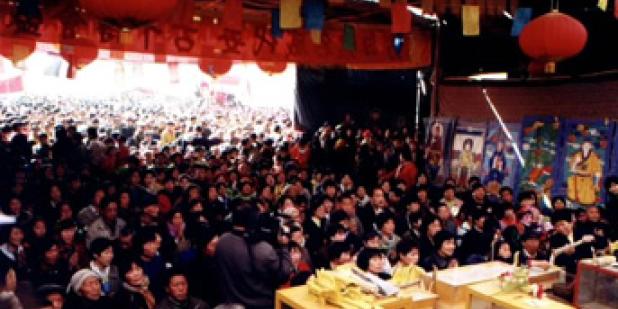Join us for a free one-day workshop for educators at the Japanese American National Museum, hosted by the USC U.S.-China Institute and the National Consortium for Teaching about Asia. This workshop will include a guided tour of the beloved exhibition Common Ground: The Heart of Community, slated to close permanently in January 2025. Following the tour, learn strategies for engaging students in the primary source artifacts, images, and documents found in JANM’s vast collection and discover classroom-ready resources to support teaching and learning about the Japanese American experience.
The Legitimacy of Miaohui and the Deconstruction and Reconstruction of Myth: A Field Study of the Transformation of Myths in Contemporary China
A talk at UCLA by Yang Lihui (Beijing Normal University)

Tuesday, April 24, 2007
4:00 PM - 5:30 PM
UCLA 11377 Bunche Hall
Los Angeles, CA 90095
Sponsor(s): Center for Chinese Studies
Scholars usually pay attention to the classical myths recorded thousand of years ago in ancient China, while often neglect those myths that spread in contemporary China. Professor Yang’s paper investigates the questions of why the Chinese still tell those old myths today, how mythtellers actively utilize myth in the current social life, and how the transformation of myth relates to the social and cultural change in contemporary China?
Professor Yang’s paper is based fieldwork in two villages concerning miaohui (lit. temple get togethers): events in which people come together at a certain date (sometimes a miaohui begins at a certain date and lasts for several days or even one or two months) to worship the god(s) in temples.
* * *
Yang Lihui, is Professor of Folklore and Mythology, Institute of Folklore and Cultural Anthropology, Beijing Normal University. She has been a Research Associate of Folklore and Ethnomusicology Department, Indiana University (2000-2001), and is currently a Associate of the Harvard-Yeching Institue, Harvard University (2006-7). Here main research interests are Chinese folklore, mythology, and popular religion.
For more information please contact
Richard Gunde
Tel: 310 825-8683
gunde@ucla.edu
Featured Articles
Please join us for the Grad Mixer! Hosted by USC Annenberg Office of International Affairs, Enjoy food, drink and conversation with fellow students across USC Annenberg. Graduate students from any field are welcome to join, so it is a great opportunity to meet fellow students with IR/foreign policy-related research topics and interests.
RSVP link: https://forms.gle/1zer188RE9dCS6Ho6
Events
Hosted by USC Annenberg Office of International Affairs, enjoy food, drink and conversation with fellow international students.
Join us for an in-person conversation on Thursday, November 7th at 4pm with author David M. Lampton as he discusses his new book, Living U.S.-China Relations: From Cold War to Cold War. The book examines the history of U.S.-China relations across eight U.S. presidential administrations.




